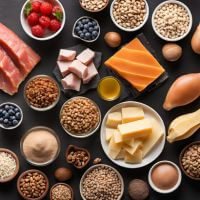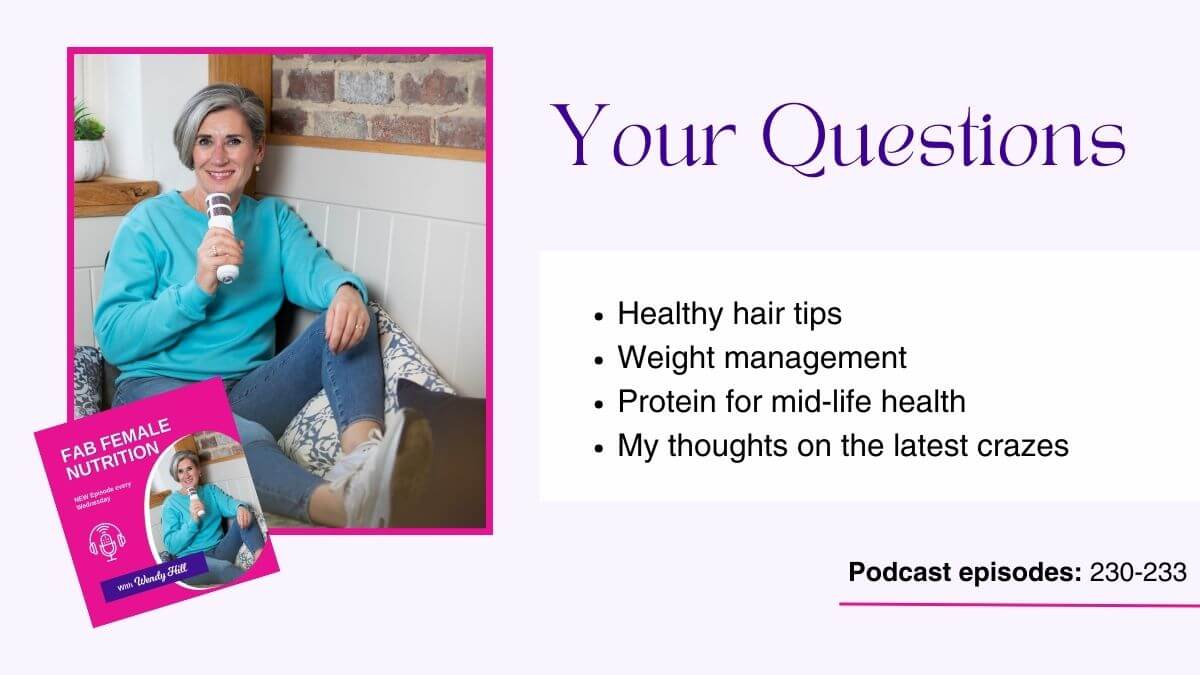There are some questions that I can asked frequently in my Fab Female Nutrition community on facebook, so I thought I would cover the four main ones in this blog. You can also listen to them on the Fab Female Nutrition podcast episodes 230 – 233
Hair skin and nail health
Many women experience noticeable changes in their hair, skin, and nails during perimenopause. Fluctuating hormones, stress, and lifestyle factors can all contribute to shifts in texture, thickness, and overall health. Understanding how diet, stress management, and supplementation can support these changes is key to maintaining strong, vibrant hair and nails.
The link between nutrition and hair health
What you eat plays a crucial role in hair health. Key nutrients such as vitamins E and A, magnesium, zinc, and selenium are essential for supporting hair growth and strength. Incorporating nutrient-rich foods like avocados, nuts, seeds, spinach, and sweet potatoes can provide the nourishment your hair needs to thrive. For those needing extra support, a high-quality supplement tailored to hair, skin, and nail health may be beneficial.*
Managing stress for stronger hair, skin, and nails
Stress is a significant factor affecting hair health. When the body is under prolonged stress, it prioritises essential functions, often at the expense of hair growth. Hair is not essential for survival, so when the body is stressed or ill, it may redirect resources to more critical functions. This means that changes in hair growth, thickness, and texture may not be immediate, and stress, illness, and poor nutrition could all be contributing factors. Incorporating stress-reduction techniques, such as mindfulness, yoga, and deep breathing, can have a profound impact on overall well-being. Additionally, getting sufficient rest and nourishing the body with a balanced diet can further support hair, skin, and nail health. If you’re experiencing noticeable hair changes, consider evaluating your stress levels and making small, manageable lifestyle adjustments to restore balance.
The role of collagen and natural supplements
As we age, collagen production naturally declines, which can lead to weaker hair, skin, and nails. For women over 40, incorporating a collagen supplement or consuming bone broth as a natural source of collagen can help maintain strength and elasticity. My favourite is Beauty Complex by our podcast sponsors Revive Active (see the bottom of this post for link and discount code). Younger individuals may benefit from ensuring they get enough vitamins and minerals from whole foods while also addressing lifestyle factors such as stress and hydration. Natural supplements containing ingredients like green tea, apple, and stinging nettle can also provide additional support, I recommend Hair and Scalp. *
By making small, intentional changes to your nutrition and lifestyle, you can support your hair, skin, and nails during perimenopause and beyond. If you’re curious to learn more, listen to the full podcast episode and subscribe for future insights!
Understanding weight changes in midlife
Weight gain in midlife is a common concern, particularly around the middle. This shift is influenced by hormonal changes, metabolism, stress, and lifestyle factors. Rather than focusing on restrictive dieting, it’s important to take a more balanced and sustainable approach to maintaining a healthy weight.
Nourishing your body instead of counting calories
Instead of focusing on calorie restriction, the key is to prioritise nutrient-dense foods that support overall wellbeing. A balanced diet consisting of protein, fibre, and healthy fats helps to stabilise blood sugar levels, support metabolism, and provide sustained energy.
Some practical strategies for balanced eating include:
- Choosing whole, unprocessed foods over refined and packaged options
- Ensuring each meal contains a good balance of protein, fibre, and healthy fats
- Reducing excessive sugar intake to help prevent energy crashes and fat storage
- Avoiding eating too late in the day, as this can impact metabolism and energy levels
Keeping a food diary can also be a useful tool for understanding eating habits and making small, sustainable changes.

The role of stress and sleep in weight management
Weight management isn’t just about what we eat—it’s also about how we live. Stress plays a significant role in weight retention, as high cortisol levels encourage fat storage, particularly around the midsection. Managing stress through movement, relaxation techniques, and mindfulness practices can support overall wellbeing.
Sleep is another crucial factor. Poor sleep can lead to increased cravings, higher calorie intake, and a disrupted metabolism. Finding ways to improve sleep quality—such as maintaining a consistent bedtime routine or using natural sleep-supporting supplements—can have a positive impact on weight management.
For more insights on this topic, you can listen to the full podcast episode where I go into greater detail on these key aspects of midlife weight management.
To listen to this podcast episode 231 released on 12th February click the link below
The power of protein in women’s health
Protein is an essential nutrient that plays a vital role in overall health, particularly for women in midlife. It supports muscle maintenance, hormone production, and immune function. Many women don’t consume enough protein, which can lead to fatigue, weakened immunity, and difficulty managing weight.
How much protein do you need?
A general guideline is to aim for one gram of protein per kilogram of body weight. However, individual needs may vary based on factors such as age, activity levels, gut health, and digestive enzyme production. Tracking your protein intake using apps like MyFitnessPal or Cronometer for a few days can help you assess whether you’re getting enough.
Sources of protein and how to incorporate it

Protein can be found in a variety of foods, not just meat. Incorporating diverse sources ensures a well-balanced diet. Some excellent sources include:
- Lean meats such as chicken, turkey
- Fish and seafood
- Plant-based proteins like lentils, chickpeas, and tofu
- Dairy products such as Greek yogurt and cottage cheese
- Nuts, seeds
- Eggs
- Protein powders (as part of a balanced meal not a sole source)
Making small but impactful changes
Instead of obsessing over numbers, the focus should be on making small, sustainable changes. Adding a portion of protein to every meal, ensuring variety in protein sources, and being mindful of overall diet balance can significantly improve energy levels and overall health.
For more details on how protein can support your wellbeing, tune in to the podcast episode where I dive deeper into this essential nutrient.
To listen to this podcast episode 232 released on 19th February click the link below
What do I think about (insert latest insta craze here)
Every few months, a new health craze pops up, promising to be the ‘game-changer’ we’ve all been waiting for. Whether it’s the latest diet hack, a ‘miracle’ supplement, or a fancy new health programme, it’s easy to get swept up in the hype. But are these trends actually worth our time, or just clever marketing? Let’s take a look at a few popular ones right now.
1. ZOE – A step in the right direction or just clever marketing?
ZOE is a supposedly personalised nutrition programme based on your gut microbiome and your glucose response to certain foods. The idea is that by tracking this data in an app, you can log your meals and receive a score, which helps you adjust your diet for better metabolic responses.
I really like their ‘30 plants a week’ approach—it’s something we often do as a challenge in my Facebook community, and I even have a free 30 Foods Challenge handout if you’d like to try it yourself!
Tim Spector, the face of ZOE, has brought some great conversations into mainstream nutrition, and there are certainly positives to the programme. But my concern is that without the right support, it’s easy to manipulate the scoring to make meals seem better or worse than they actually are. Plus, it’s quite pricey. Before signing up, I’d recommend checking the costs and considering whether working with a nutritional therapist (like me!) might offer more tailored and sustainable support for a similar price.
2. MCT Oil – Why would you want to just eat oil?
MCT stands for medium-chain triglycerides, a type of fat typically derived from coconut oil. It’s rapidly absorbed and often promoted for energy, brain function, and fat loss, particularly in keto and low-carb circles. You might remember the ‘bulletproof coffee’ trend from a few years ago—that was largely fuelled by MCT oil hype.
I’m all for healthy fats, but I’d rather see people getting them from real food—nuts, seeds, oily fish, avocado, olive oil—rather than an isolated, processed oil. MCT oil isn’t a magic bullet for weight loss or energy. If you want to feel more energised, focus on nourishing your body with whole, balanced meals rather than looking for a quick fix.
3. GLP-1 receptor agonist medication – a shortcut or a slipper slope?
GLP-1 is a hormone that promotes feelings of fullness, and the theory is that since increased weight is linked to higher mortality risk, reducing weight through appetite suppression is a good solution. GLP-1 medications work by increasing satiety, which leads to reduced food intake.
However, my concern is that if people don’t change what they’re eating, they may just end up eating less of the same ultra-processed foods. There’s a fantastic book by Johann Hari, The Magic Pill, which explores the risks and benefits of this medication in more depth.
The good news? You can naturally support your GLP-1 levels simply by eating more fibre! A fibre-rich diet encourages the production of short-chain fatty acids, which stimulate GLP-1 release, helping you feel fuller for longer. Fibre also slows digestion, meaning you don’t get hungry as quickly.
Rather than relying on medication, I’d always recommend prioritising fibre, an often-overlooked nutrient in modern diets. A balanced, whole-food diet will naturally support satiety and long-term health.
4. Restrictive Diets – Keto, Fasting, Low-Carb… Do they work?
It goes without saying that my approach is always balance first. Eating a wide variety of whole foods each week is far more sustainable than extreme restrictions.
I focus on helping people make realistic and lasting changes to their existing diet—so they can create a way of eating that suits them, rather than following a plan designed for someone else.
It’s also worth remembering that some restrictive diets were originally created for medical purposes. For example, the ketogenic diet was developed to help people with seizures, and while it can be incredibly beneficial in that context, it doesn’t mean it’s right for everyone. If you don’t have seizures, do you really need to follow a keto diet? I’d argue no—but ultimately, the choice is yours.
Final note
Health trends will always come and go, each claiming to be the ultimate breakthrough. But the fundamentals of good health haven’t changed. You don’t need expensive tests, isolated supplements, or complicated food rules to feel your best.
Instead, focus on the basics—nourish your body with real, whole foods, eat a wide variety, and listen to how food makes you feel. Sustainable health isn’t about chasing trends; it’s about creating habits that work for you in the long term.
So, before jumping on the next big thing, ask yourself: Does this truly support my well-being, or is it just another quick fix?
To listen to this podcast episode 233 released on 26th February click the link below
Did you enjoy the topic of these episodes, have you got any feedback or questions? Please reach out to me via my social media channels, I’d love to hear from you. And don’t forget to subscribe to the podcast so that you don’t miss an episode.
My links
A note about our sponsor
Revive Active, Ireland’s leading Super Supplement Brand, we are proud to have them as sponsors of this podcast as their formulas stand out as a powerhouse of premium ingredients, working together in perfect harmony to bring you optimum benefits.
Revive Active is committed to selecting components that not only enhance your vitality but also cater to your specific needs. Every ingredient is carefully chosen for its efficacy and is supported by rigorous scientific research. Revive Active believes in transparency. What you see on the label is what you get – no hidden ingredients or undisclosed fillers, binders, caffeine, or stimulants. Convenience meets effectiveness in every sachet, from radiant skin to boosted energy levels, each formula is designed to enhance your overall well-being.
My favourites from their range
REVIVE ACTIVE is a powerhouse of 26 active ingredients—your essential replenishment for what life takes out with the support of HERO ingredients like CoQ10 for cellular energy, Citrulline DL Malate to fight fatigue and support heart health, and L-Arginine for active blood flow.
Meet MASTERMIND, your brain’s secret weapon! This specially formulated supplement supports brain function with a potent mix of 7 vitamins, 1 mineral, Omega 3 DHA, Uridine, and Choline—all in one handy sachet. Enhance mental focus, and beat that mid afternoon slump without interfering with your sleep, this is your maximum productivity and focus tool. Plus, it’s Vegetarian, Gluten-Free, and Halal Certified.
BEAUTY COMPLEX, one of the award-winning super supplements, boasts 8 potent ingredients in one easy, convenient sachet. Featuring Type 1 Marine Collagen, Hyaluronic Acid, Phytoceramides and Biotin, the synergy of these HERO ingredients goes beyond aesthetics, aiming to reduce visible signs of aging and enhance your overall look and feel. Beauty, indeed, starts from within.
Embrace menopause fearlessly with MENO ACTIVE—a product backed by over two years of dedicated research. This unique blend of 31 active ingredients, including 12 vitamins, 7 minerals, 4 plant extracts, Omega 3 DHA and more, is designed to support you during this transformative journey of change. With a daily sachet and capsule, it’s a powerful combination to navigate the menopausal phase with ease. Meno Active is your empathetic companion for a smoother transition.
Join me and countless women who have made Revive Active an integral part of their daily routine, experiencing a positive impact on their health and overall well-being.
Want to know more about ways to work with me?
There are many ways that you can work with me to balance your hormones and improve your health and wellbeing.
On Facebook the Fab Female Nutrition Club is a wonderful FREE community where I offer lots of support and advice on female health and wellbeing. I also love to cook and create recipes and I’ll often be seen in the group cooking live and sharing all the wonderful health benefits of the ingredients used.
My Fab Female Nutrition Membership sits alongside the free club, but offers you lots of resources and group coaching with me. The hub has the full recipe book that is constantly being updated, the 5 elements of health containing resources and guides to help support you in your health journey. And 6 group coaching calls a year, plus access to other member benefits such as discounts from group programs.
A few times a year I work with groups of ladies to transform their health and wellbeing. Appropriately called The Transformation Program it can help with many differing issues and we have had hugely impressive results – including up to 100% reduction in symptoms. If you suffer with IBS, fatigue, inflammation, hormonal imbalances or just want to spend some time concentrating on your health and wellbeing they are fabulous value and great fun.
If you feel like you need a more bespoke option, then my 1:1 coaching and testing is for you. We will concentrate on your specific needs creating nutritional protocols that support your health goals. We take a full health history, then tailor testing to help create and refine protocols so that you learn about your body and how to support it. I will be with you every step of the way to guide you and ensure that you realise your true health potential. Find out more here.
*always seek the advice of a professional before taking any supplements or herbal formulations.

